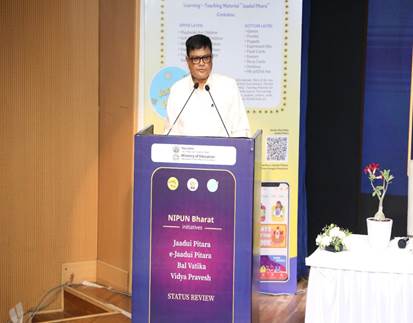New Delhi: Sanjay Kumar, Secretary of School Education & Literacy at the Ministry of Education, chaired a meeting aimed at advancing the broader objectives of Early Childhood Care & Education (ECCE). Held at the Ambedkar International Centre in New Delhi, the meeting saw the participation of representatives from the Ministry of Women & Child Development (MoWCD), various states, and autonomous bodies of the Department of School Education & Literacy (DoSE&L).
At the heart of the discussion was the need for a continuum of pre-school education and school education, as envisioned under the National Curriculum Framework-Foundational Stage (NCF-FS), to ensure seamless transition and quality ECCE.
In his address, Sanjay Kumar underscored the significance of every stakeholder’s role in ensuring quality ECCE. He commended the initiatives undertaken by MoWCD and various states/Union Territories (UTs) in this regard.
Key recommendations emerged from the meeting, including the establishment of three Balvatikas for 3 to 6-year-olds for pre-primary education in all Central Board of Secondary Education (CBSE) and Kendriya Vidyalayas with Class 1. Additionally, the co-location of Anganwadis with primary schools in villages was proposed in coordination with MoWCD to facilitate preschool education and smooth transitions to Grade 1.
The utilization of Jaadui Pitara (magical trunk) at government schools with pre-primary classes was also discussed as a means to provide a comprehensive learning experience. Suggestions were made for the National Council of Educational Research and Training (NCERT) to collaborate with state officials in assessing existing learning toys to ensure alignment with NCF-FS goals.
Moreover, it was proposed that the Ministry of Education (MoE) and MoWCD collaborate to link Poshan Tracker and Unified District Information System for Education (UDISE+) data to track pre-primary to Class-1 transitions. States were encouraged to define parameters and utilize Requests for Proposals (RFPs) for Jaadui Pitara materials to streamline procurement processes.
Further discussions revolved around standardizing branding for programs such as NIPUN Bharat, Jaadui Pitara, e-Jaadui Pitara, and Vidya Pravesh across states to enhance visibility and recognition. It was suggested that the adopted and adapted versions of Jaadui Pitara should align with the prescribed learning outcomes curated by NCERT, with NCERT providing support to State Councils of Educational Research and Training (SCERTs) in adhering to designated learning outcomes.





